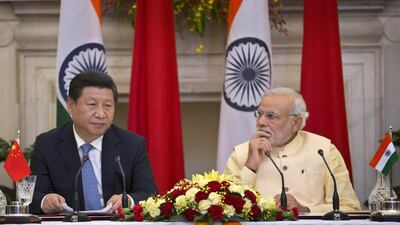Earlier this month, India's external affairs minister, Sushma Swaraj, asserted in parliament that prime minister Narendra Modi had "brought respect to the whole of India". Ms Swaraj, once bruited as a potential premier, is a capable minister, proactive, conscientious and, for a holder of one of the great offices of state, unusually accessible to the ordinary public. But even she could not defy Mr Modi, whose grip on the Bharatiya Janata Party has grown so tight that public obeisances to the leader are now the norm in a party that once prided itself on its egalitarian character.
Since his election in 2014, Mr Modi has appeared to treat foreign policy as a platform for self-promotion. His visits to foreign capitals are capped off with breathlessly publicised speeches to select members of the Indian diaspora. Mr Modi’s personal gains are many; the benefits to India are few, if any. Parliament has been reduced to a mute spectator. Momentous decisions that will affect India long after the current prime minister is gone have been made with barely any debate.
In 2015, for instance, Mr Modi placed an order for three dozen Rafale jets without consulting his defence minister. The following year he pushed through a controversial logistics pact with the United States by suppressing debate. Anyone with a concern was labelled a relic of the Cold War, a carryover from the days of paranoid anti-Americanism. The terms of the deal grant each side's military access the other's facilities to retool and refuel. America's assets, theoretically accessible to India, are of no use to Delhi, but India's assets are immensely valuable to an America that is "pivoting" to Asia. The agreement – stymied for a decade by Delhi's wise bureaucrats – already looks self-wounding in the erratic age of Donald Trump.
Even the most peaceable citizen will have to concede that India faces credible threats from China and Pakistan. But the intensification of relations with Washington under Mr Modi has done nothing to enhance India's security. At the 2016 Brics summit, held in Goa, China managed successfully to shield Pakistan from censure. Even Russia, not long ago India's most sympathetic foreign partner, seemed indifferent to Delhi's concerns. Moscow even proceeded to stage a joint military exercise with Pakistan despite India's objections – unthinkable only a few years ago.
_____________________
More on Narendra Modi
Modi tackles India's problems one smartphone app at a time
Goods and services tax heralds a new economic era for India
Modi meets Trump for the first time at White House
_____________________
Mr Modi has managed to compress into three years the mistakes made by his predecessors over many decades. Unable to cope with bad headlines at home, he decided to make a surprise visit to Pakistan in December 2015. He embarrassed his own cabinet, which was kept in the dark about his travel plans; provoked the extremists within Pakistan’s military-intelligence camorra, whose price for tolerance of democracy in Pakistan has always been enmity with Delhi; and invited an attack on India, which materialised within weeks of his return from Pakistan. Far from jump-starting a peace process, Mr Modi’s actions plunged the two nations into a deep crisis – and possibly cost Nawaz Sharif his job.
This is the reality of Mr Modi's record in office. But even the most uncharitable critic of the prime minister cannot overlook the role of India's national security adviser, Ajit Doval, in shaping Mr Modi's decisions. Mr Doval, only the fifth occupant of the powerful office created less than two decades ago, is perhaps the most influential National Security Adviser to date. His job, broadly speaking, is to work with the National Security Council to identify political, economic and security concerns and counsel the prime minister. Mr Doval had no diplomatic experience. His principal qualification for the job, it seems, was his personal rapport with the prime minister.
_____________________
More from Kapil Komireddi
Book review: Arthur Cotterell's The Near East sets out to tell the whole story of civilisation
Will the uncomfortable truths of a movie about India's Emergency survive the censor's cuts?
Have India's rocket men sent a nation on a wrong-headed quest for status?
_____________________
Mr Doval’s frailties have been on display ever since he was hired in 2014. His predilection for force, distaste for discretion and addiction to publicity have strained relations and alienated partners. India has for years carried out raids against militant posts inside Myanmar. But Mr Doval became the first national security adviser to advertise – in pursuit of personal glory – a raid conducted on his watch, prompting a furious Naypyidaw to terminate its cooperation with Delhi. Mr Modi’s decision to impose a blockade on Nepal, reportedly made at Mr Doval’s behest, drove Kathmandu into the arms of India’s archrival, China. Old hands in Ms Swaraj’s ministry are troubled, especially by Mr Doval’s disastrous handling of Pakistan. As one official told the journalist Swati Chaturvedi last year, “Doval has no experience of foreign affairs or diplomacy. He's clearly out of his depth and Pakistan and China are running rings around us”.
The patriotic passions provoked by India's ongoing military standoff with China at Doklam, the tri-junction of the two countries with the Kingdom of Bhutan, raise further concerns. The impasse at Doklam, if not resolved, has the potential to escalate into yet another conflagration between India and China. Mr Doval doesn't inspire any confidence. India needs a new national security adviser.

